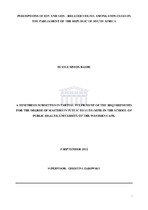Perceptions of HIV and AIDS - related stigma among employees in the parliament of the republic of South Africa
Abstract
The threat that HIV/AIDS poses to most institutions, including the Parliament of the Republic of South Africa, can potentially be decreased by reducing stigma and discrimination. Parliament’s Policy on HIV and AIDS provides protection for people living with HIV and AIDS (PLWHA) against stigma and discrimination. The purpose of this study was to explore employee perceptions of HIV/AIDS stigma in the Parliament of the Republic of South Africa in order to inform improved anti-stigma strategies and interventions. This exploratory qualitative crosssectional study used individual interviews and focus group discussions among Parliamentary employees to examine perceptions of: HIV/AIDS related stigma in the workplace, the
effectiveness of Parliament’s HIV/AIDS response strategy, and how HIV/AIDS-related stigma might be effectively addressed. A total of 49 respondents participated in: a) 19 individual interviews across five employment grades (A-Band to E-Band). b) 4 focus group discussions of 6- 9 people each. Data was analysed using thematic analysis. Five main themes were identified, as well as additional sub-themes. The main themes were: the actual acts of discrimination (enacted stigma), concerns related to disclosure, assumptions and preconceptions about causes and signs of HIV infection, concerns about psychological impact and lack of knowledge and education. Discrimination was generally described as being treated differently, as well as prejudice and negative attitude to a person with HIV/AIDS. More specifically, it was understood as labelling those who are HIV positive negatively and ostracizing them. Gossip and lack of confidentiality were the main barriers to disclosure and testing while weight loss and long term sick leave were
interpreted as classic signs of a person who is HIV positive in Parliament. Fear played a major role in these respondents’ accounts of HIV/AIDS related stigma, while the perceived widespread ignorance was attributed to lack of information, knowledge and education. Respondents perceived Parliament’s HIV/AIDS response strategy to be ineffective. They suggested more awareness and training, establishment of support groups, involvement of PLWHA and involvement of Senior Management in addressing HIV/AIDS related stigma in Parliament.

